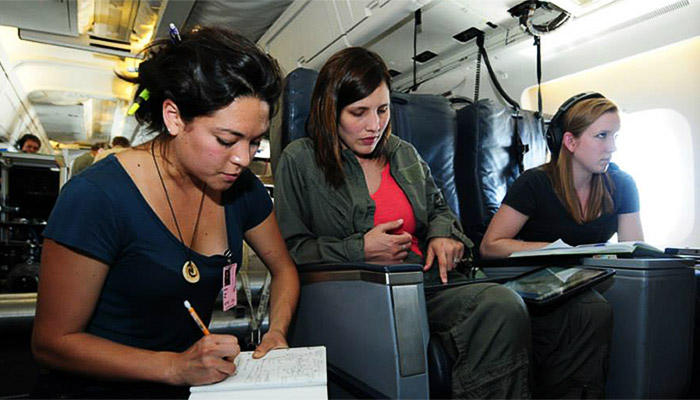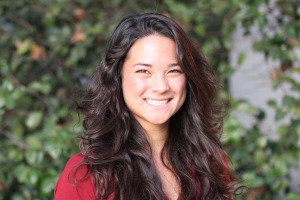
It’s five o’clock in the morning, and Taia Wu ’15 is already in the belly of a hollowed-out Boeing airplane with an assortment of scientific instruments, flying over Palmdale, California, as part of NASA’s earth sciences program.
The atmospheric conditions under research require low elevations, so the air is denser and bumpier. As a result, some of the undergraduates have to take something for their stomachs; a few NASA scientists monitoring the instruments sit in spare seats, chatting and sharing cookies.
The flight campaigns are Wu’s favorite part of the day. “Most people don’t even know NASA has an earth sciences department,” she says.
Wu’s work falls under the aegis of the Student Airport Research Program (SARP), which enlists undergraduates to conduct all manner of research at NASA’s Palmdale center. Her team, for example, collected data last summer for a project measuring the amount and size of particles in the region’s air. And Southern California’s notoriously smoggy air provides a useful environment for atmospheric research.
Much of NASA’s earth science research focuses on interactions among the air, oceans, land, and ecosystems to understand climate change and how human activities affect the environment. SARP recruits from around the country fly in and live together in communal housing for eight weeks, where they work with atmospheric scientists on group research projects. Students supervised and instructed by NASA scientists collect and analyze data using a computer program and present the results at the end of the internship period.
The scientists are genuinely enthusiastic about the work the students do, and students easily bond while working together on their projects.
“I was kind of intimidated going in,” says Wu about starting the program. “But when I got there, everyone got along really well. It was surprisingly chill.”
 Dr. Babak Sanii at the W.M. Keck Science Department first suggested Wu apply for the internship. A former communications engineer at Jet Propulsion Labs, Sanii believed Wu had the skills to succeed, and his confidence in Wu encouraged her to follow through.
Dr. Babak Sanii at the W.M. Keck Science Department first suggested Wu apply for the internship. A former communications engineer at Jet Propulsion Labs, Sanii believed Wu had the skills to succeed, and his confidence in Wu encouraged her to follow through.
“When this internship call came up, I immediately thought of her,” he says. “I’m delighted she pursued it, and I have enjoyed learning about airborne laboratories through her experiences.”
Wu’s research eventually became the subject of her senior project. When first studying chemistry, she never guessed she’d complete a thesis based on atmospheric research done at NASA.
“The more you talk to professors, the more you’ll hear them say, ‘Oh, I didn’t know what I was going to do when I was your age; it’s okay,'” Wu says. “That was really comforting.”
Upon graduation from Scripps, Wu plans to spend some time learning “as much biology as I can” to complement her chemistry major. She then plans to apply to graduate programs in biochemistry. As for NASA, she’d like to work with them again, but is keeping her plans open to other opportunities… including early morning desert flyovers.

